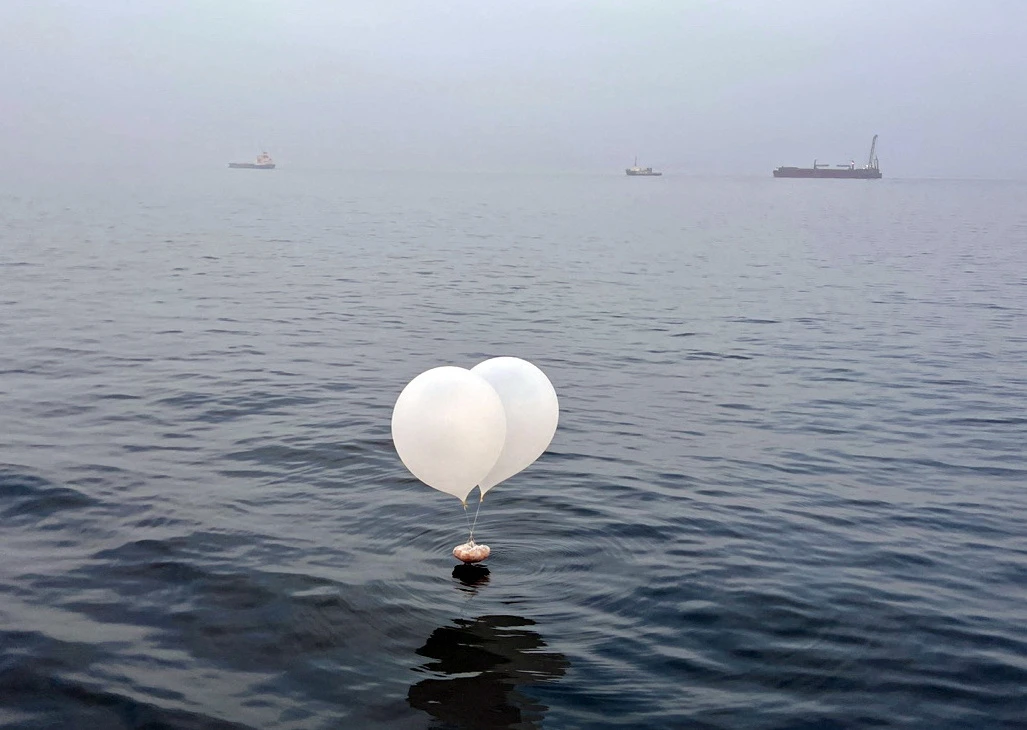North Korea sends hundreds of trash-filled balloons southward, Seoul says
 A balloon filled with trash sent by North Korea is pictured at the sea off Incheon, South Korea, June 9, 2024 (Reuters)
A balloon filled with trash sent by North Korea is pictured at the sea off Incheon, South Korea, June 9, 2024 (Reuters)
North Korea has escalated its cross-border campaign by sending hundreds of trash-filled balloons into South Korea, Seoul’s military reported Tuesday. This act marks the latest in a series of provocative exchanges between the two nations, which have sparked a tit-for-tat propaganda war.
Seoul’s Joint Chiefs of Staff (JCS) confirmed that approximately 350 balloons were launched by Pyongyang on Monday evening, followed by additional launches late Tuesday. The JCS stated that around 100 of these balloons had landed in South Korea, primarily in northern Gyeonggi province and the capital, Seoul.
The attached bags contained “mostly paper waste,” according to military analysis, and posed no safety threat to the public. “The South Korean military is ready to carry out its psychological warfare immediately,” the JCS added, stressing that the response would be contingent on North Korea’s actions.
In a speech commemorating the anniversary of the Korean War’s start, South Korean President Yoon Suk Yeol condemned the balloon launches as a “despicable and irrational provocation.” He also criticized a recent agreement between Pyongyang and Moscow, signed by Russian President Vladimir Putin during a state visit to North Korea, labeling it a “blatant violation of UN Security Council resolutions.”
“Our military will maintain a steadfast readiness to ensure that North Korea does not dare to challenge South Korea under any circumstances and will respond overwhelmingly and decisively to any provocations from the North,” Yoon asserted.
North Korea claims the balloon launches are in retaliation for balloons sent by South Korean activists carrying propaganda critical of Kim Jong Un’s regime. In response to these provocations, Seoul has suspended a tension-reducing military agreement and resumed propaganda broadcasts from loudspeakers along the border.
Kim Yo Jong, Kim Jong Un’s sister and a key government spokesperson, warned that Seoul would “undoubtedly witness the new counteraction of the DPRK” if the leaflet drops and loudspeaker broadcasts continued.
Experts warn that the situation could quickly escalate. “Since the South has met the first condition — which is the leaflet scattering — if the government were to resume loudspeakers, we would likely see the ‘new counteraction’ that was mentioned,” said Park Won-gon, a professor at Ewha Women’s University.
Further heightening tensions, President Yoon visited a U.S. aircraft carrier on Tuesday. The carrier arrived in South Korea over the weekend for joint military drills aimed at better countering North Korean threats. These drills, involving Japan, are scheduled to proceed later this month, despite Pyongyang’s routine criticism of such exercises as rehearsals for an invasion.



